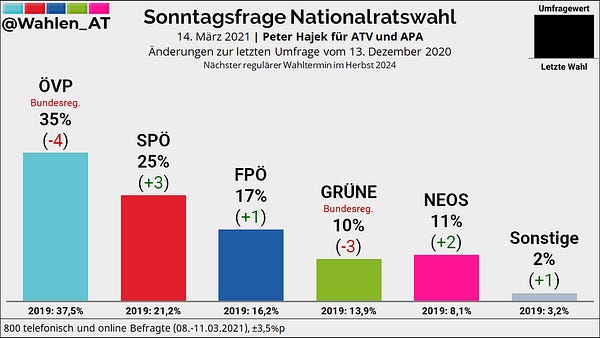Testing Isn't Working
The Austrian government's expansion of testing capacity hasn't stopped coronavirus case numbers from exploding in the weeks since its third lockdown ended
Servus!
Two weeks ago (“Testing, Testing”), I wrote about the Austrian government’s plan to test its way out of lockdown. By greatly expanding testing capacity and demanding people produce negative coronavirus test results in order to access certain services, shops, hairdressers, and museums could re-open. In summarizing the strategy, I wrote that “perhaps testing can manage the virus but its progress [can] only be turned back via a fourth lockdown, which is unlikely to hold, or mass vaccination.”
Indeed. As of Monday, March 15, there were 39,369 active coronavirus cases in Austria. More than 5,000 cases were recorded in Vienna in the last seven days alone. The current seven-day incidence rate per 100,000 residents is 209.8. In the states of Salzburg, Vienna, Lower Austria, and Carinthia, the rate is higher than that—closer to 300 in Salzburg, for example. State-level vaccination programs have focused on the over-80s and those with pre-existing medical conditions; intensive care beds reserved for coronavirus patients are nonetheless currently at 39.0 percent capacity.
A national seven-day incidence rate above 200 should trigger a review of existing coronavirus-related rules and regulations; if the tabloids are to be believed, Austria will be heading for a fourth lockdown after the Easter holidays in early April. If that is indeed the case, chancellor Sebastian Kurz certainly isn’t giving the game away at this stage. Kurz seems resistant to the economic costs of a fourth lockdown for small- and medium-sized businesses and there is tremendous pressure from the states to allow for a return to outdoor dining. On the basis that many restaurants are already offering takeout anyway, Vienna, for example, continues to plan for a March 27 re-opening in spite of ever-rising case numbers.
The government’s testing strategy is evidently failing, a fact that has not gone unnoticed by the voting public. A poll administrated by Peter Hajek and published by the TV channel ATV and wire agency APA over the weekend showed that the current coalition would not have a working majority in parliament were an election held tomorrow. Since Hajek’s last poll in December, the People’s Party (ÖVP) have slipped back 4 points to 35 percent while the Greens are down 3 to 10 percent. Perhaps this is why grumblings about a possible coalition break-up are growing ever louder (even if talk about an opposition red-green-pink government with Freedom Party (FPÖ) outside support is pure fantasy).


Both the rising case numbers and the relatively slow rate of vaccination—1,053,599 doses of the coronavirus vaccine have thus far been administered including 778,715 first doses—also explain why Kurz called an extraordinary press conference Friday in order to call into question the equity and fairness of the EU’s vaccine procurement and distribution program. According to the chancellor, the EU has reneged on a previously-agreed plan to divvy up available doses among member states on a per head basis. He described the EU as a ‘bazaar,’ with member states striking separate—and, in Kurz’s interpretation of events, secret—side deals for extra doses.
Smoke and mirrors—according to the EU, at least. It was the member states who “decided to depart from the Commission's proposal by adding a flexibility which allows agreeing on a different distribution of doses, taking into account the epidemiological situation and the vaccination needs of each country.” The ‘bazaar’ aspect was, in other words, put of the plan to begin with, and though France and Germany took up the option to buy extra doses of the Pfizer and Moderna vaccines, Austria—which didn’t want to pay the price and instead decided to stick with the cheaper Oxford/AstraZeneca vaccine—did not. In search of culprits, the government has no one to blame but itself.
Bis bald!
Thank you for subscribing to the Vienna Briefing. Do you know someone who would be interested in receiving this newsletter? Consider sharing it with them today.
Oxford In
Austria’s states will continue vaccinating against the coronavirus using the Oxford/AstraZeneca jab, its national vaccination board confirmed following a sitting Monday evening. The move comes after EU member states including France, Germany, Italy, and Spain suspended its use claiming a possible link between the jab and incidences of thrombosis.
Auer Out
Health minister Rudolf Anschober has removed Clemens Martin Auer, a high-ranking civil servant in the health ministry, from his post on the EU’s vaccination advisory board. Auer stands accused of refraining from informing Anschober of the possibility of buying extra vaccine doses within the remit of the EU’s procurement program.
Intel Reform
Austria’s domestic intelligence service, the Federal Office for the Protection of the Constitution and Terrorism Prevention (BVT), is to be broken up as part of reforms agreed upon by the coalition government. Intelligence gathering is to be centralized and separated from the future Department for State Security and Intelligence’s (DSN) policing function.




